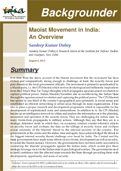Maoist Movement in India: An Overview
Summary
 It is clear from the above account of the Maoist movement that the movement has been violent and comparatively strong enough to challenge, at least, the security forces and pose threats to the local government officials. The movement is primarily spearheaded by a Maoist party, i.e. the CPI (Maoist) which derives its ideological and militaristic inspirations from the China’s Mao Tse Tung’s thoughts which propagates agrarian armed revolution to capture political power. Indian Maoists/Naxalites aim at overthrowing the Indian State through the agrarian armed revolution and capturing the political power. The CPI (Maoist) has spread to one-third of the country’s geographical area (primarily in forest areas) and established an efficient networking in urban areas through its mass organizations. It has also in place a proper research and development programme which is responsible for the development of sophisticated arms and ammunitions. In addition to it, the CPI (Maoist) has set up an intelligence network to collate and analyse the information as to the planning, movement and operation of the security forces. They are challenging the Indian state on many fronts—from propaganda to military actions. Although they say that they are in a strategic defensive mode in which they, on occasions, conduct counter-offensive attacks on security forces and civilians, the data on the killings of security forces and civilians reveal enormity of the Maoists’ threat to the internal security of the country. The governments at the centre and the states, time and again, have acknowledged the threat as the biggest internal security threat/challenge ever faced by India. The Central and the State governments have made some efforts on two fronts, development as well as security, to curtail the Maoist menace. However, the governments have not been really successful in countering the Maoists’ propaganda against the Indian state, which would give them strategic leverage vis-à-vis the Indian state in psychological warfare. The governments need to instil confidence into the affected mass towards the State through providing them with development, opportunity and sense of security.
It is clear from the above account of the Maoist movement that the movement has been violent and comparatively strong enough to challenge, at least, the security forces and pose threats to the local government officials. The movement is primarily spearheaded by a Maoist party, i.e. the CPI (Maoist) which derives its ideological and militaristic inspirations from the China’s Mao Tse Tung’s thoughts which propagates agrarian armed revolution to capture political power. Indian Maoists/Naxalites aim at overthrowing the Indian State through the agrarian armed revolution and capturing the political power. The CPI (Maoist) has spread to one-third of the country’s geographical area (primarily in forest areas) and established an efficient networking in urban areas through its mass organizations. It has also in place a proper research and development programme which is responsible for the development of sophisticated arms and ammunitions. In addition to it, the CPI (Maoist) has set up an intelligence network to collate and analyse the information as to the planning, movement and operation of the security forces. They are challenging the Indian state on many fronts—from propaganda to military actions. Although they say that they are in a strategic defensive mode in which they, on occasions, conduct counter-offensive attacks on security forces and civilians, the data on the killings of security forces and civilians reveal enormity of the Maoists’ threat to the internal security of the country. The governments at the centre and the states, time and again, have acknowledged the threat as the biggest internal security threat/challenge ever faced by India. The Central and the State governments have made some efforts on two fronts, development as well as security, to curtail the Maoist menace. However, the governments have not been really successful in countering the Maoists’ propaganda against the Indian state, which would give them strategic leverage vis-à-vis the Indian state in psychological warfare. The governments need to instil confidence into the affected mass towards the State through providing them with development, opportunity and sense of security.







